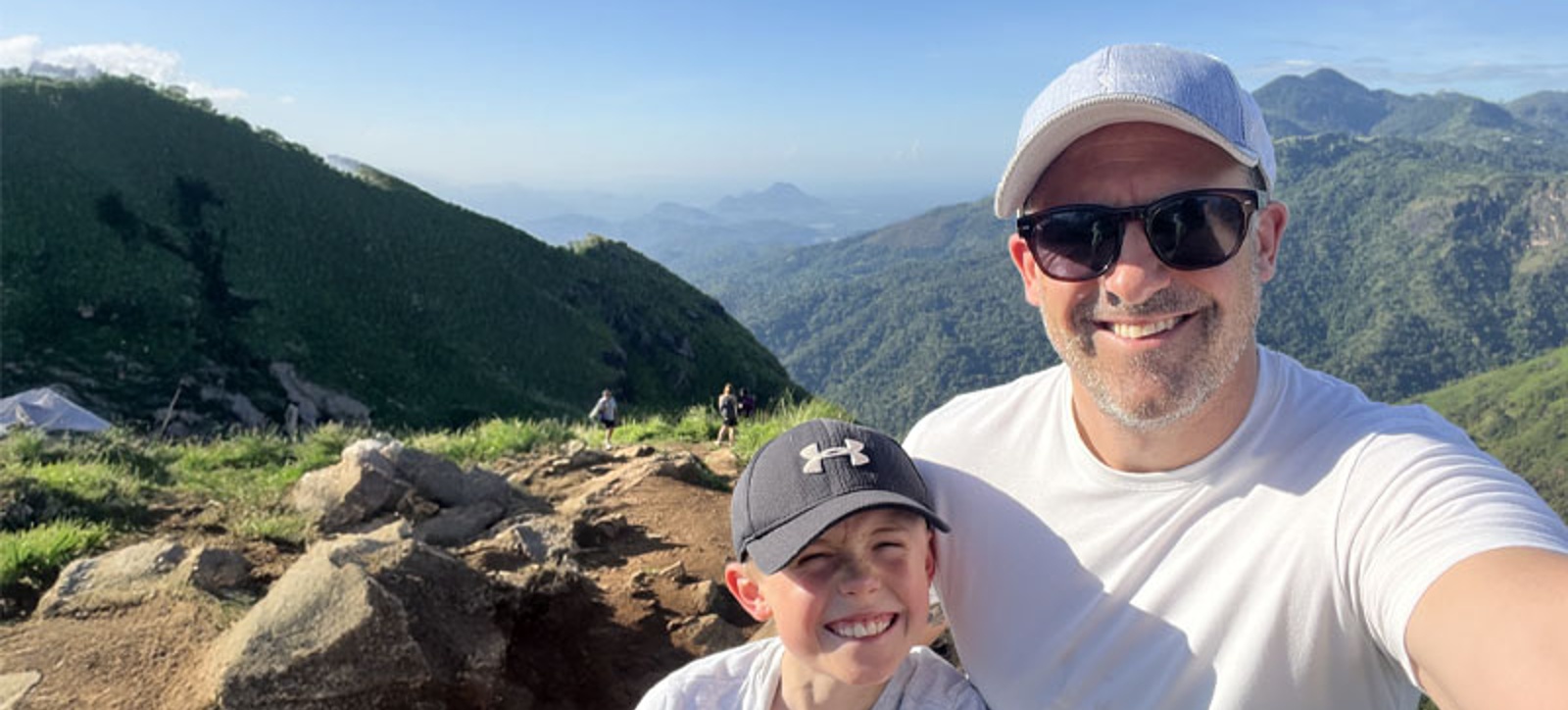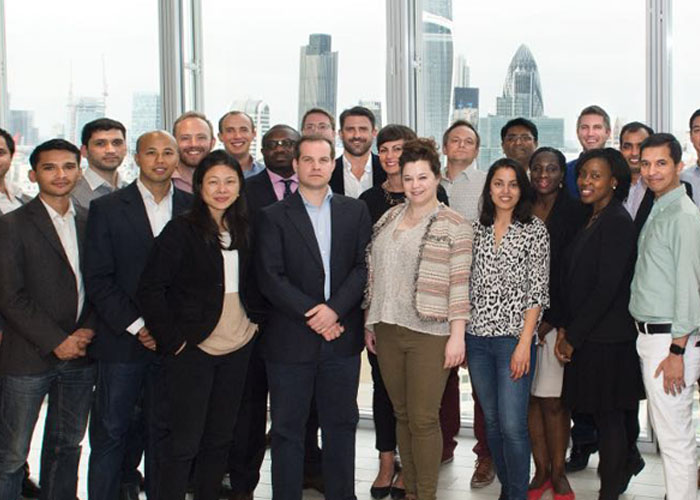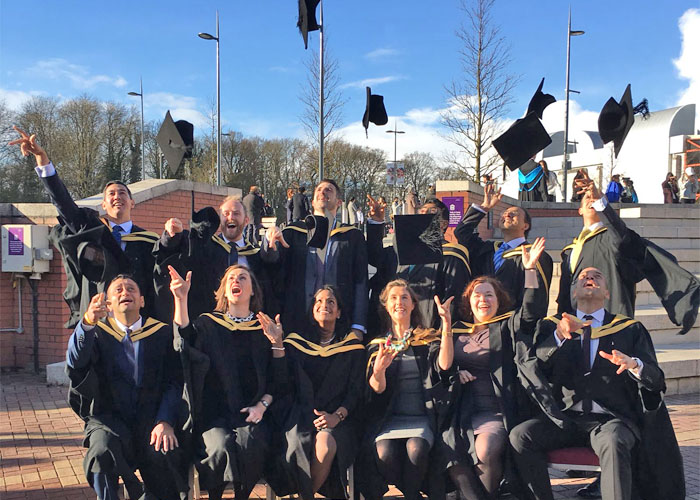
Special time: Rob Douglas, pictured with his son in Sri Lanka, was part of the first cohort at WBS London at The Shard
When Rob Douglas joined the inaugural cohort of Warwick Business School’s London-based Executive MBA in 2015, he was already a retired British Army officer with four years’ experience after transitioning into finance.
As WBS celebrates 10 years at The Shard, Rob's career reads like a masterclass in strategic reinvention spanning military leadership, private banking for high net-worth individuals, venture capital in biotech, and now running his own wealth management business.
Rob, who began his professional life in the armed forces after earning a first-class degree in History from Durham University, believes the MBA helped him bridge the gap between the barracks and the boardroom.
From the heights of WBS London at The Shard to the launch of his own advisory firm, Rob’s journey is a compelling case study in how education can catalyse transformation; not just in career trajectory, but in mindset, confidence, and ambition.
"The Shard was such a great place to study," says Rob, of Wimbledon in South West London. "The course began with intense Friday-Saturday fortnightly sessions covering six compulsory modules, but it transitioned to a slower pace when we switched to elected modules. I was often up early to study before work, along with late shifts and a few lost weekends - but it was a hugely enjoyable and rewarding experience.
"It was intense as my family was expanding quickly, with a baby born two months before the course started and another six months before it ended. It was a great time of life but pretty busy!”

Rob describes his career as falling into neat decadal patterns. The first, his twenties, was dominated by the Army (one year before university and six years after). He served two tours in Afghanistan and rose to the rank of Captain in the Duke of Wellington's Regiment before resigning his commission from what by then had amalgamated into the Yorkshire Regiment.
Leaving the Army in 2011, he then began 10 years in consecutive client-facing roles with three large multinational financial institutions – Barclays, Royal Bank of Canada and Deutsche Bank – during which he completed the Executive MBA.
"The course was particularly useful for someone with an operationally active military background and humanities degree," says Rob. "It really helped enhance my financial and business knowledge, skills, and academic credentials for a private sector financial career."
While working for the private banks, Rob gained his wealth management credentials, which eventually took him onto his third career stage. This involved setting up his own city-based advisory, VFC Wealth Management.
Rob is now 43 and has been running his business successfully for three years, operating on a self-employed basis within the umbrella organisation of St James's Place, a FTSE 100 company.

Before setting up VFC, Rob spent a short time during the COVID-19 pandemic establishing the UK operations of a US biotech start-up from Harvard University.
"The MBA really helped me handle this unfamiliar role, although the work remained private client-focused, it was around raising capital and setting up operations in the UK. The role was highly entrepreneurial and proved a stepping stone between working at large organisations and my current small business set up."
His MBA also helped secure a job that Cambridge Science Corporation (CSC), and he continued part-time study there, with online modules in bioscience offered by Harvard Medical School (in genetics and immunology). This, along with the regular need to top up his professional financial qualifications, fitted with Rob’s objective of life-long learning, which he includes as one of his new company’s six key brand values.
"CSC gave me the taste for working in an environment where I could have considerable influence," says Rob.
"My aim was to replicate this by setting up my own business in an industry where I had already gained experience."
VFC Wealth management gets its name from the Duke of Wellington’s Regimental motto, Virtutis Fortuna Comes (VFC) which translates as 'fortune favours the brave'. Rob also chaired the Dukes London Group (DLG), a networking organisation for people that left his regiment for three to four years, which overlapped with the MBA. He has built his company brand around his military associations and financial experience.
Rob says: "Much of the groundwork for the business has been completed and I hope to expand overseas in the next couple of years, with Singapore and Dubai potentially in scope. In some ways, I regret not taking the MBA overseas placement in China, as I may explore setting up in Hong Kong if appropriate where I was born and brought up. Most of my class-mates went to China, and had an amazing time, but I could not make the dates. Instead, I kept it local in Germany, taking a corporate finance module at the prestigious Manheim University."
"There is a big difference between a part-time Executive MBA and a Full-time MBA, with the full-time version normally coming earlier career-wise and part-time later. The outcome from it is different too, with Executive MBAs less about career change and more about career progression – which in my case included speedy promotions at the financial institutions where I worked. It also gave me confidence to change direction, set up my own business and build the franchise."
The biggest benefits of the MBA for Rob were intangible, including greater confidence and ability to interact with senior executives – adding to the gravitas that comes with age and experience, which together enables what he does now.
Another big intangible takeaway was the expansion to his network, including beyond the course to the wider WBS alumni. Rob said this had benefited him over time both personally and professionally, including a couple of current clientss.
He was particularly impressed by the flagship elective Leadership module, although it was not what he expected compared to his year studying at Sandhurst Royal Military Academy. Rob learned that management in the corporate commercial environment was very different to leadership in the forces, although the two are complimentary, and nuggets of that that have stayed with him.
"I also enjoyed and benefited from my dissertation, which involved trying to ascertain if entrepreneurs are born or bred – an offshoot of the nature versus nurture debate – focusing on people who founded businesses after leaving the military," says Rob. "Not only was it hugely rewarding but I met and interviewed many interesting people in the research process and it has helped me set up my own business."
Further reading:
From GP to CMO: How an MBA at The Shard shaped a clinical leader's career
Warwick Business School celebrates 10 years at The Shard
Financial Times ranks WBS third in the world in online MBA ranking
Discover Warwick Business School's Change Makers.




 X
X Facebook
Facebook LinkedIn
LinkedIn YouTube
YouTube Instagram
Instagram Tiktok
Tiktok